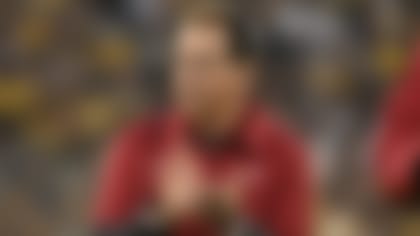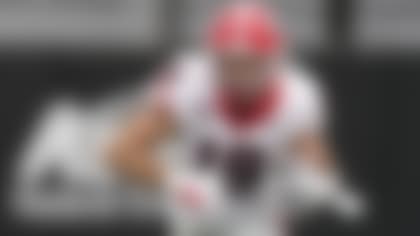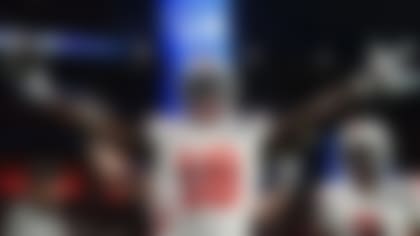The NFL Scouting Combine is over, which means it is time to look back at the prospects who helped themselves and those who did not. Here are six that fit for each category (players listed alphabetically).
Who helped their stock
Clemson DE Vic Beasley: Beasley, who is 6-foot-3, played at 235 pounds as a senior, and his lack of size and bulk was an issue. He took care of that by weighing in at 246 pounds. Fine, but could he carry the weight? If Sunday is an indication, he certainly can. Beasley fired off a 4.53 40, with an impressive 10-yard split of 1.59 seconds. He also had an eye-opening vertical jump of 41 inches and a broad jump of 10 feet, 10 inches. And in what should come as no surprise to people who watched him at Clemson, he looked smooth as silk in all the drills. The upshot: He thrust himself back into the conversation as the top edge rusher in the draft.
LSU OT La'el Collins: Collins' athleticism was in question when he arrived in Indy. The questions are gone. He had as good a day as anyone Friday and solidified his spot as a first-rounder. Collins (6-4 1/2, 305) ran the 40 in 5.12 seconds, with a 10-yard split of 1.81 seconds, and he looked extremely good in the position drills. Collins was a left tackle for the Tigers, but some analysts felt he fit best on the right side or even at guard in the NFL. Everyone knows that the big money goes to left tackles. Collins kept himself in line for the big money.
Connecticut CB Byron Jones: If you didn't know who Jones was before Monday -- and if you hadn't looked at NFL Media analyst Daniel Jeremiah's top 50 prospects list, you probably didn't -- you certainly do now. Despite being less than a month removed from shoulder surgery, Jones caused jaws to drop with an otherworldly broad jump of 12 feet, 3 inches. Jones (6-0 5/8, 199) also had an eye-opening vertical jump of 44.5 inches. And while he didn't run the 40-yard dash, Jones looked quite good in the 20-yard (3.94 seconds) and 60-yard (10.98 seconds) shuttles.
Michigan State CB Trae Waynes: Waynes was the top cornerback for most analysts entering the combine, and he solidified that standing with his excellent 40 time of 4.31 seconds Monday; his unofficial 10-yard split was an impressive 1.53. Wayne is the big (6-0 1/8, 186) cornerback teams covet, and he probably is coveted even more after his blazing run. Indeed, Jeremiah said he thought Waynes now easily could slide into the top 10 because of his 40.
West Virginia WR Kevin White: There was doubt coming into the combine about White's speed. That doubt is gone, and it was extinguished in the 4.35 seconds it took for him to cover 40 yards Saturday. White's size (6-2 5/8, 215), production and, yes, speed make it seem extremely likely he will be the first wide receiver off the board April 30. And this is a good draft for receivers, too.
Florida State QB Jameis Winston: No one who has seen Winston on the field should have been surprised by how razor-sharp he looked in his drill work Saturday. Still, there is no doubt he was razor-sharp, showing off his arm strength, solid footwork and ability to make all the throws he was asked. Plus, it doesn't hurt that former NFL coach/current NFL Network analyst Steve Mariucci gushed about his football IQ.
Who hurt their stock
Nebraska RB Ameer Abdullah: Abdullah is a great guy and might be the most solid citizen in this whole draft. His work on the field for the Huskers also was impressive. And he soared to a 42.5-inch reading in the vertical jump. But in a crowded running back class, Abdullah did himself no favors with a 4.6 clocking in the 40. Straight-line speed always is a (note that we did not say "only") determining factor for running backs, and his relatively pedestrian 4.6 gives pause.
Auburn WR Sammie Coates: Coates has good size (6-1 3/8, 212) and looked really good in the vertical jump (41 inches) and broad jump (10 feet, 9 inches). But his 40 time of 4.43 was disappointing -- most expected a sub-4.4. His drill work was extremely spotty. A big knock on Coates coming into the combine was his inconsistent hands, and that is a knock that remains. He just did not look natural, or even comfortable, in the receiving drills.
TCU LB Paul Dawson:Dawson's performance was considered so poor that he felt the need to respond. The one aspect about Dawson that can't be overlooked is that on the field during the season, he played at an extremely high level and showed off excellent instincts. The thing is, on the field Sunday, he didn't look very athletic. At all. He can erase the memories of Sunday, though, with a good pro day on March 27. (The same goes for TCU S Chris Hackett, who had an awful 40 time Monday -- 4.81. Still, like Dawson, Hackett sure looked good on the field during the season.)
Michigan WR Devin Funchess: He started his Michigan career as a tight end and moved to wide receiver this season. But he clocked just 4.7 in the 40 Saturday, which was disappointing. He remains a matchup problem because of his size (6-4 1/4, 232), but those expecting a 40 time in the high 4.5s/low 4.6s left shaking their heads. A wide receiver running a 4.7, no matter how tall, is disconcerting.
Miami LB Denzel Perryman: Perryman hits a ton and is a throwback linebacker of sorts. But his lack of height (5-10 3/4) is bothersome to some, and he looked slow when he ran his 40 on Sunday (4.78). Not that the 40 time will be the final determining factor, but the other contenders for top pure inside linebacker in the draft were faster: Mississippi State's Benardrick McKinney (4.66, and he is almost 5 inches taller) and UCLA's Eric Kendricks (4.61). Perryman's drill work was uninspiring, too, and he just does not look to be a "twitchy athlete."
Washington LB Shaq Thompson: One issue with Thompson is his position at the next level -- is he a linebacker, a safety or even a running back, a position he played some for the Huskies? All that was overshadowed a bit Sunday, when he didn't wow anybody with his workouts. He ran a 4.64 in the 40, a disappointing time for a guy thought to be a high-level athlete. His vertical jump (33.5) also was disappointing.
Mike Huguenin can be reached at mike.huguenin@nfl.com. You also can follow him on Twitter @MikeHuguenin.











